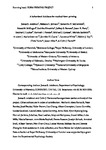A behavioral database for masked form priming
| dc.contributor.author | Adelman, JS | |
| dc.contributor.author | Johnson, RL | |
| dc.contributor.author | McCormick, SF | |
| dc.contributor.author | McKague, M | |
| dc.contributor.author | Kinoshita, S | |
| dc.contributor.author | Bowers, JS | |
| dc.contributor.author | Perry, JR | |
| dc.contributor.author | Lupker, SJ | |
| dc.contributor.author | Forster, KI | |
| dc.contributor.author | Cortese, MJ | |
| dc.contributor.author | Scaltritti, M | |
| dc.contributor.author | Aschenbrenner, AJ | |
| dc.contributor.author | Coane, JH | |
| dc.contributor.author | White, Laurence | |
| dc.contributor.author | Yap, MJ | |
| dc.contributor.author | Davis, C | |
| dc.contributor.author | Kim, J | |
| dc.contributor.author | Davis, CJ | |
| dc.date.accessioned | 2018-02-16T14:43:00Z | |
| dc.date.available | 2018-02-16T14:43:00Z | |
| dc.date.issued | 2014-12 | |
| dc.identifier.issn | 0743-3808 | |
| dc.identifier.issn | 1554-3528 | |
| dc.identifier.uri | http://hdl.handle.net/10026.1/10800 | |
| dc.description.abstract |
Reading involves a process of matching an orthographic input with stored representations in lexical memory. The masked priming paradigm has become a standard tool for investigating this process. Use of existing results from this paradigm can be limited by the precision of the data and the need for cross-experiment comparisons that lack normal experimental controls. Here, we present a single, large, high-precision, multicondition experiment to address these problems. Over 1,000 participants from 14 sites responded to 840 trials involving 28 different types of orthographically related primes (e.g., castfe–CASTLE) in a lexical decision task, as well as completing measures of spelling and vocabulary. The data were indeed highly sensitive to differences between conditions: After correction for multiple comparisons, prime type condition differences of 2.90 ms and above reached significance at the 5% level. This article presents the method of data collection and preliminary findings from these data, which included replications of the most widely agreed-upon differences between prime types, further evidence for systematic individual differences in susceptibility to priming, and new evidence regarding lexical properties associated with a target word’s susceptibility to priming. These analyses will form a basis for the use of these data in quantitative model fitting and evaluation and for future exploration of these data that will inform and motivate new experiments. | |
| dc.format.extent | 1052-1067 | |
| dc.format.medium | ||
| dc.language | en | |
| dc.language.iso | en | |
| dc.publisher | Psychonomic Society | |
| dc.subject | Lexical decision | |
| dc.subject | Megastudies | |
| dc.subject | Orthographic priming | |
| dc.subject | Visual word recognition | |
| dc.title | A behavioral database for masked form priming | |
| dc.type | journal-article | |
| dc.type | Clinical Trial | |
| dc.type | Journal Article | |
| dc.type | Research Support, Non-U.S. Gov't | |
| plymouth.author-url | http://gateway.webofknowledge.com/gateway/Gateway.cgi?GWVersion=2&SrcApp=PARTNER_APP&SrcAuth=LinksAMR&KeyUT=WOS:000347099100014&DestLinkType=FullRecord&DestApp=ALL_WOS&UsrCustomerID=11bb513d99f797142bcfeffcc58ea008 | |
| plymouth.issue | 4 | |
| plymouth.volume | 46 | |
| plymouth.publication-status | Published | |
| plymouth.journal | Behavior Research Methods | |
| dc.identifier.doi | 10.3758/s13428-013-0442-y | |
| plymouth.organisational-group | /Plymouth | |
| plymouth.organisational-group | /Plymouth/REF 2021 Researchers by UoA | |
| plymouth.organisational-group | /Plymouth/REF 2021 Researchers by UoA/UoA04 Psychology, Psychiatry and Neuroscience | |
| plymouth.organisational-group | /Plymouth/REF 2021 Researchers by UoA/UoA04 Psychology, Psychiatry and Neuroscience/UoA04 Psychology, Psychiatry and Neuroscience MANUAL | |
| dc.publisher.place | United States | |
| dcterms.dateAccepted | 2014-02-01 | |
| dc.identifier.eissn | 1554-3528 | |
| dc.rights.embargoperiod | Not known | |
| rioxxterms.versionofrecord | 10.3758/s13428-013-0442-y | |
| rioxxterms.licenseref.uri | http://www.rioxx.net/licenses/all-rights-reserved | |
| rioxxterms.licenseref.startdate | 2014-12 | |
| rioxxterms.type | Journal Article/Review |


